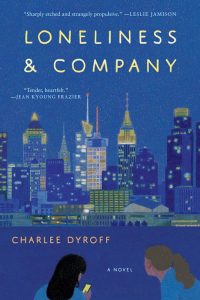Bloomsbury
Review by Brian Tanguay

The world Charlee Dyroff creates in her novel, Loneliness & Company, is familiar and strange at the same time. New York City has become a backwater. Drones deliver meals and other necessities. Toasters eject slices of bread onto plates. As people enter buildings a camera makes an assessment of their current mood. NYC isn’t where Lee thought she’d land after finishing her Program with honors. She’s a hotshot researcher who expected to land a job with one of the Big Five, but here she is, working for a company she’s never heard of.
At first Lee and her fellow researchers don’t know precisely what it is they’re working on. They are given categories to focus on like Money, Childhood or Belief Systems, then disappear into their Screens for hours at a time. As time passes they learn the objective of their research: training an AI named Vicky to be a palliative against loneliness which is apparently enough of a problem that the government is willing to fund the research.
Lee is driven, obsessively focused on work, competitive, a distance runner who has few close relationships. Her roommate, Veronika, annoys her. Early in the novel Lee discovers a diner that a small plaque tells her has been in existence for 175 years. No screens or buzzing drones operate in this diner. Lee is handed an anachronistic plastic-encased menu by a plump woman with a heavy Eastern European accent. There are real smells here, omelet, butter, a hint of sweet syrup; jazz plays from a speaker; people converse, laugh. It’s more stimulation than Lee is used to.
More and more data is collected and fed to Vicky much of it from Lee. She develops a text-message based relationship with Chris, who occupies a role on the project team. They make plans to meet in person, but some emergency or other prevents Chris from showing up. Meanwhile, to help the project over the line, Lee volunteers to be monitored 24/7, allowing her every experience and emotion to be fed to Vicky. Lee isn’t oblivious to the ethics involved, but her desire for a successful and hopefully career-defining outcome outweighs her reservations. She begins wearing a watch.
It’s at this point that Lee became for me a more rounded character. Wearing the watch changes the way she behaves, she begins to seek out experiences for Vicky’s benefit, but also for her own, pushing herself beyond her comfort zone, including a romantic relationship with G. She feels compelled to try things, often basing her decision making on random criteria. She goes for a run completely naked. She models naked for an art class. She goes out wearing two different shoes. Soon she’s spiraling and becomes convinced that Chris is an AI.
The novel ends with a couple of twists which I won’t spoil. “Loneliness is difficult to understand, to track,” writes Dyroff. “It appears and disappears in mysterious ways.” The message is one we already know: technology may be incredibly efficient and convenient, but it’s still no substitute for human connection.
